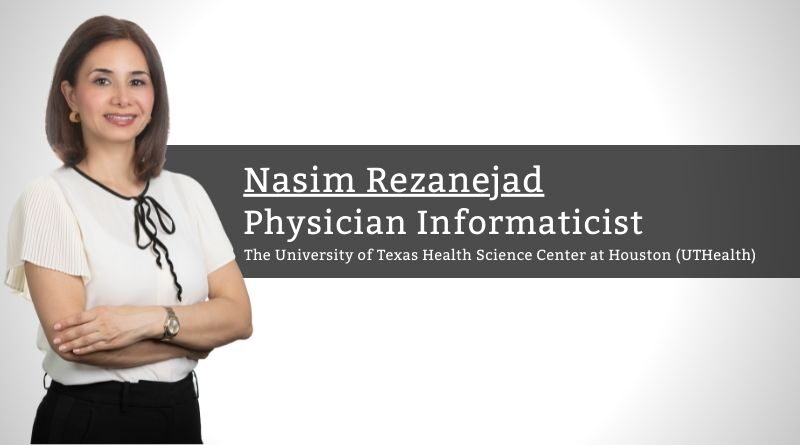The state of AI in Medicine
By Nasim Rezanejad, MD, MS, Physician Informaticist, The University of Texas Health Science Center at Houston (UTHealth)
Many claims have been made about AI and what it can do in Healthcare; in order to bring AI to the clinic safely and ethically. AI is described as any use of algorithms to enable diagnosis, prognosis and treatment recommendation for the patients. It is a big term that helps clinicians or physicians to communicate ideas to the general public. A lot of what is done encompasses the science of machine learning- that is providing large amounts of data to algorithms in order to arrive at certain conclusions. There are two types of AI;
- General AI and
- Narrow AI
Narrow AI is the type of AI that we apply in Medicine right now; which is to teach a machine to perform a very narrow task that a human can do.
Bringing new technologies and new algorithms to healthcare is critical; we need to figure out how to do that in a safe and effective way to transform care.
Bringing new technologies and new algorithms to healthcare is critical; we need to figure out how to do that in a safe and effective way to transform care. There is opportunity in the entire world of health Information to figure out ways to be more preventative and to collect the right information and close the disparity in care gap as well.
Some of the things that have changed and led to revolutionary advances in healthcare-related to AI and its various manifestations.
1. Massive availability of data at scale in electronic form that we do not have to do data entry or data extraction manually.
2. A change in incentive structures makes it imperative that we have to do something with those data to improve the quality and value of the care provided to the patients.
3. The availability of the cheap enough computes to actually use those data.
4. Algorithms or models that can significantly improve work performance, accuracy of work, which is good for patient care if it could do this a lot faster than a human.
5. It will free the physicians or Clinicians to focus on more high-level intellectual tasks.
I do not think the role of the physicians will go away. AI is not going to put physicians out of business. Medicine is inherently a human enterprise and that empathy, that human element of caring for another person, is not something that algorithm can reproduce. However, AI will augment physicians or clinicians’ work to bring their work more effectively to patients.
At this point, there is still a huge gap between what is asked for these models to do and the comprehensive tasks that our physicians and clinicians do. Down the road, it will be expected to see continued advancement of each of these tasks in a way that we hope will make all physicians and clinicians perform at the highest possible level but still have a physician in the loop.
Clinical deployment- using these models requires an additional level of technology and infrastructure and takes time to learn how to do completely digital diagnosis with an AI model. So, until, we can seamlessly incorporate that into the current workflow, it will be a barrier to widespread adoption of AI in many areas of medicine.
Looking forward, it is important not to underestimate how AI can impact health and healthcare.
1. AI has the potential to increase inequality in healthcare. A broad example would be societies that have access to medical AI versus those that do not have. Already, we have healthcare disparities, and the have or have nots might increase that gap further.
2. The most exciting thing we have and have been under-estimating is the use of AI outside of the healthcare system. So, it comes back to help us in healthcare, in primary care and in-home care could get revolutionized, long term care facilities if AI comes up with right ways to care for people in their own homes with the use of assistive technology.
3. AI is used for good, but how about if it will be used for bad? If someone comes up with a generative adversarial network to generate fake positive cancer diagnoses.
4. Artifacts and image acquisition could cause the model to be confident about the wrong diagnosis. As these tools get adopted would the physician be sufficiently skewed in one direction or another. So, looking at the physician or the clinician interaction with these tools is a very important factor.
Furthermore, training the next generation of physicians and clinicians not only to utilize but also to advance AI in ways that will enable the physician and clinicians to deliver better care for the patients. It is important to learn the basics of AI, artificial neural networks, deep learning, cognitive machine learning, understand the tools, principles and technologies behind, data literacy, informatics literacy, machine learning using big data and Python.
In conclusion, AI has the capability to shift healthcare from episodic reactive care to continuous and proactive care. By collecting the right data, organizing data to unlock, activate the information, image acquisitions, algorithms or models, and delivering information to fully help patients.



